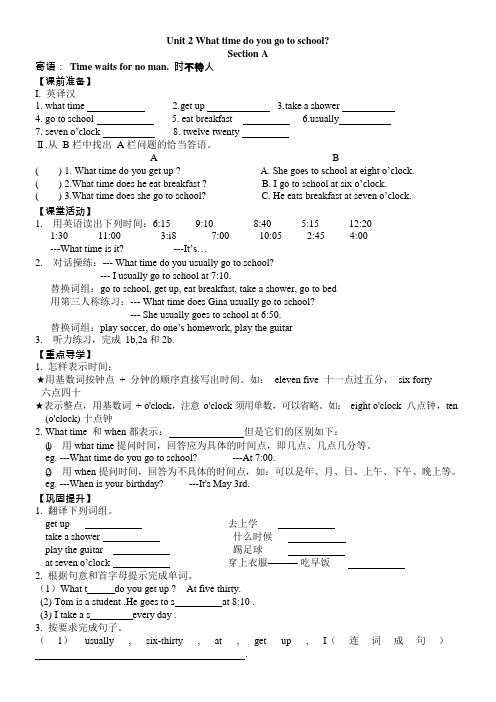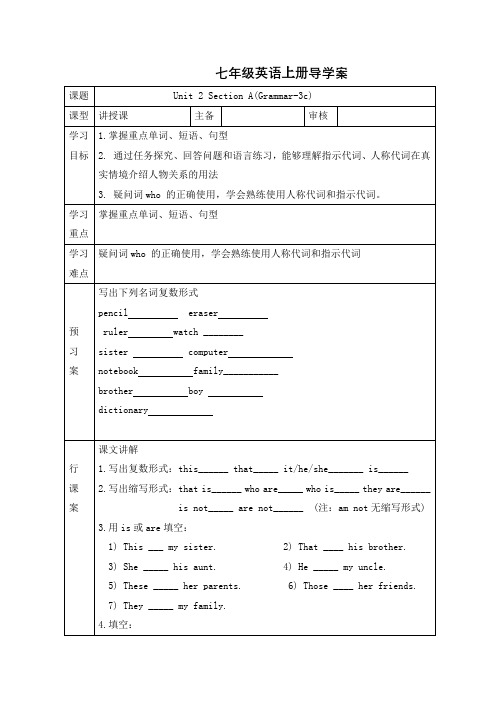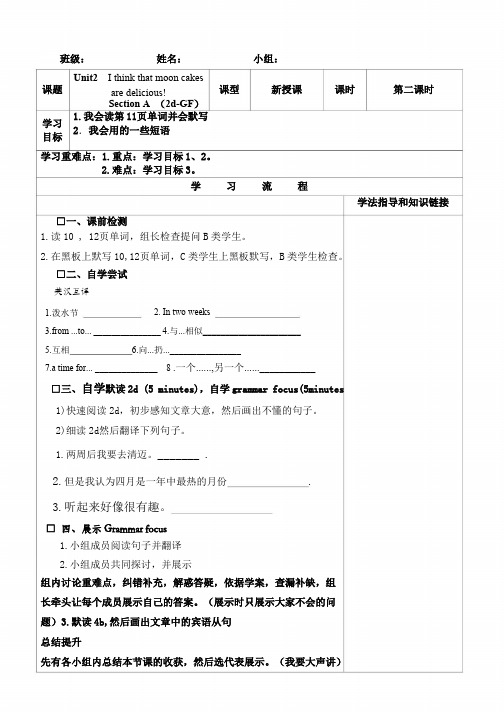Section A第2课时(导学案)
人教新目标八下导学案:Unit 2 I’ll help to clean up the city parks.Section A(2a-2c)

班级:组名:姓名:日期:2014/2/21 编制:八年级英语备课组课题:Unit 2 I’ll help to clean the city parks. Section A(2a-2c)课时:第2课时【学习目标】1.掌握重点单词: sign, notice, lonely.2.掌握重点短语: come up with, put off, hand out, call up, used to, care for.3.掌握重点句型: need to do sth. Let’s do sth.重点:could向他人提建议, 动词短语的区别,角色扮演难点:文中的复会句。
【学习准备】学生:完成预习案。
教师:编制导学案、制作多媒体课件、制作教具等。
【预习案】使用说明&学法指导:1.正确拼读P10单词并牢记;2.预习2a-2c,勾重点短语和句子并翻译;3.熟读2d对话,理解句意。
4. 15分钟独立完成。
I预习导学词汇精粹1.根据汉语意思写单词标志(n.)________ 通知(v.)__________ 孤独的(adj..)___________2. 翻译下列短语和句子1.想出_______2.推迟______3.张贴__________________4.分发____________5.打电话___________6.清洁日________________7.care for ______________ ed to______________ 9.help out_____________3. 自读、小组内互读单词和词组。
【探究案】Step1一群学生正在策划一个城市公园清洁日。
听录音,并勾出他们为告诉人们关于城市清洁日要做的事,完成2a。
(独立完成,自己核对答案,预时2分钟)Step2朗读2b中的句子,再听一遍录音,并填空,完成2b。
(独立完成,2分钟)Step3用2a和2b中的信息编写对话,完成2c。
人教新目标Go For It! 初中英语七年级下册Unit 2 What time do you go to school$%Section A导学案(2)

Unit 2 What time do you go to school?Section A寄语:Time waits for no man. 时不待人【课前准备】I.英译汉1.what time2.g et up3.t ake a shower4.go to school 7. seven o’clock5. eat breakfast8. twelve twentyuallyⅡ.从 B 栏中找出A 栏问题的恰当答语。
A B( ) 1. What time do you get up ? A. She goes to school at eight o’clock.( ) 2.What time does he eat breakfast ? B. I go to school at six o’clock.( ) 3.What time does she go to school? C. He eats breakfast at seven o’clock.【课堂活动】1. 用英语读出下列时间:6:15 9:10 8:40 5:15 12:201:30 11:00 3:i8 7:00---What time is it? ---It’s…10:05 2:45 4:002.对话操练:--- What time do you usually go to school?--- I usually go to school at 7:10.替换词组:go to school, get up, eat breakfast, take a shower, go to bed用第三人称练习:--- What time does Gina usually go to school?--- She usually goes to school at 6:50.替换词组:play soccer, do one’s homework, play the guitar3.听力练习,完成1b,2a 和2b.【重点导学】1.怎样表示时间:★用基数词按钟点+ 分钟的顺序直接写出时间。
Unit 2 Section A 导学案 人教版七年级英语上册

6.Those ________ their apples. Where ________ his apples?
七年级英语上册导学案
课题
Unit2 Section A(Grammar-3c)
课型
讲授课
主备
审核
学习
目标
1.掌握重点单词、短语、句型
2.通过任务探究、回答问题和语言练习,能够理解指示代词、人称代词在真实情境介绍人物关系的用法
3.疑问词who 的正确使用,学会熟练使用人称代词和指示代词。
学习
重点
掌握重点单词、短语、句型
Yes, ____ ____. No, ____ ______.
5. He’smy father.(对划线部分提问)
______ he?
6. They’remy grandparents.(对划线部分提问)
_______ they?
二、用am,is,are填空
1.Excuse me! ________ this your eraser?
学习
难点
疑问词who 的正确使用,学会熟练使用人称代词和指示代词
预
习
案
写出下列名词复数形式
pencileraser
rulerwatch ________
sistercomputer
notebookfamily___________
brotherboy
dictionary
行
课
案
课文讲解
1.写出复数形式:this______that_____it/he/she_______ is______
8)他是我的弟弟。_______ my brother.
Section A第二课时导学案练习

Section A导学案一.读1a, 回答问题1. Where does Darren come from? ____________________________________________2. How is Michael going to make a plan for Darren?_______________________________ 二.在文中找到,划出并背诵下面的短语1.很高兴收到你的贺卡_______________2.享受你的旅行______________________3.忙着为…做准备______________________4.在度假______________________________5.来到中国度假________________________6.骑着我们的自行车考察北京____________7.非常有趣____________________________8.四十分钟后__________________________9.在康康家___________________________10.做一份考察北京的计划_______________ 11.考察明朝的陵墓____________________12.和我们一起来______________________13.带他去那儿________________________14.上课______________________________15.爬山______________________________16.读仁爱英语报______________________17.敲(门,窗…)_______________________18.在对话中__________________________19.仔细算出费用______________________20.当然,的确________________________三.在文中划出下面的句子并翻译1. Glad to receive your postcard. 思考:本句是个省略句,完整形式是:________ glad to receive your postcard.点拨: receive --- 收到receive sth. from sb.__________________区别:She received(收到)his present, but she didn’t accept (接受)it.2. While you were enjoying your trip, I was busy preparing for my exams.译:__________________________________________________________________思考一: be busy doing sth.________________ 链接:be busy with sth.---忙于某事思考二: prepare for…_______________链接:prepare sth.for sb.______________练习:a.学生们都在忙着写作业。
人教版九年级英语全册Unit2 Section A (2d-GF)导学案

学法指导和知识链接
□一、课前检测 1.读 10 , 12页单词,组长检查提问 B 类学生。
2.在黑板上默写 10,12页单词,C 类学生上黑板默写,B 类学生检查。 □二、自学尝试
英汉互译
1.泼水节
2. In two weeks
3.from ...to... _______________ 4.与...相似______________________
Hale Waihona Puke (她住在哪里)in 2002.
4.
exciting news!(what/what a/how).
5.We are not sure if it
tomorrow.If it
,we won’t go hiking.
A.will rain ,rains
B.will rain,will rain
C.rains, rains
班级:
姓名:
小组:
课题
学习 目标
Unit2 I think that moon cakes
are delicious! Section A (2d-GF) 1.我会读第 11页单词并会默写
2.我会用的一些短语
课型
新授课
课时
第二课时
学习重难点:1.重点:学习目标 1、2。 2.难点:学习目标 3。
学习流程
5.互相
6.向...扔...________________
7.a time for... ______________ 8 .一个......,另一个......___________
□三、自学默读 2d (5 minutes),自学 grammar focus(5minutes
Unit 7 It's raining Section A 1a-2d 导学案(含答案)

3.—H________ is it going?—Not bad.
4.He s________ English very hard.
5.Look! Your mother is p________ chess.
6.The trees are white because of the s________.
It sounds like a good idea.那听起来像个好主意。
Nick sounds like a good name.尼克听上去是个不错的名字。
He looks like his father.他看起来像他父亲。
6.Can I take a message for him?
当接电话的人发现对方要找的人不在时,常用take a message。message为可数名词,意为“消息;信息”;take a message for sb.意为“为某人捎个口信”。常用短语还有:give sb. a message给某人捎口信,leave a message留口信。send a message to sb./send sb. a message给某人发信息
eg:-What's the weather like today?今天天气怎么样?
-It’s raining/snowing/blowing/thundering and lighting.
正在下雨/下雪/刮风/打雷和闪电。
-It’s sunny/windy/cloudy/rainy/snowy/fine
Hold on for a moment/minute.请稍等。
【归纳总结】打电话常用语小结:
(1)“打电话找某人”的常用句型:
八年级上册英语unit2导学案Section A( Grammar focus-3c)
课题:Unit 2 How often do you exercise?第二课时(Grammar focus-3c)学习目标:1、重点单词Maybe(adv.) 大概;或许;可能;least(adv.) 最小;最少;(adj.&pron.) 最小的;最少的2、重点词组hardly ever几乎不曾;stay up熬夜;play sports进行体育活动;at least至少3、重点句式(1).——How often do you go to the movies?——你多久看一次电影?——I go to the movies maybe once a month.——我可能每月看一次。
(2) ——Do your parents play sports?——你父母进行体育活动吗?——Never. They always too busy.——从来不。
他们总是太忙。
重点难点:重点:频率副词的用法。
难点:能够用频率副词等谈论课余时间的各项活动。
导学设计:1.They often help with housework.他们经常帮助做家务。
(1) help作动词,意为“帮助”,常构成短语:help sb. with sth. 或help sb. do sth.,意为“______”。
例如:他经常帮助我学英语。
He often ______me _____English.(2)help也可作名词,意为“帮助”,这时help为______名词。
例如:你需要一些帮助吗?Do you need some ______?2.sometimes作副词,意为“有时”,多用于______。
例如:他有时上课迟到。
He sometimes ______ _____ for class.知识巩固:一、翻译下列短语1. 去看电影________________2. 在周末___________3. 几乎不; 很少_____________4. 每周五次__________5. 每月两次_______________6. 熬夜____________7. 做运动_________________ 8. 至少_____________9. 去购物_________________ 10. 看电视_____________Keys: 1.go to the movies 2. on weekends 3. hardly ever 4. five times a week5. twice a month6. stay up7. play sports8. at least9. go shopping 10.watch TV二、用所给词的适当形式填空。
8年级下册英语导学案Unit2
学校:班级:小组:姓名:小组评价:教师评价:Unit 2 I’ll help to clean up the city parks.第一课时 Section A(1a-1c)【学习目标】1.会使用重点单词cheer,volunteer...,重点短语clean up,cheer up,give out...2.会使用“I could...”、“I hope to...”等句型,向别人提供协助。
3.能听懂、能说出“协助他人,参加社会公益活动”的相关话题。
【学习重难点】1.掌握cheer,volunteer...,clean up,cheer up,give out...的用法。
2.用重要句型向别人提供协助。
【学法指导】1.查词汇表,自学本课时新词汇。
2.朗读1b,勾画有用的表达:clean up,cheer up,give out,at the food bank3.互助学习,练习对话。
【自学互助】一.温故知新:和同伴议一议,讨论回答以下问题。
1.Do you think helping other is great?2.What will you do if you are a volunteer? Please give some examples.二.翻译以下短语。
1.清扫__________2.分发___________3.使快乐;振奋____________________4.sick children________________5.at the food bank__________________6.after-school study program______________________三.通过互助学习后,我的疑惑是_____________________________________________________________________________ 【展示互导】看图说,仔细听,认真评通过观察1a图片中你能够协助人们的方式,然后列出更多其他方式。
人教新目标八下导学案:Unit 3 SectionA2a-2d
年级: 八年级学科: 英语主备人: 审核人: 执教人: 班级: 课题Unit 3 SectionA2a-2d 课型新授课(第2课时)学习目标1.掌握2a-2d的词语2.继续学习提出礼貌的请求和请求允许;学习重点掌握一些家务活动相关的动词短语。
掌握情态动词could的用法和助动词do的用法。
学习难点掌握情态动词could的用法和助动词do的用法学习程序学习过程学习札记【1】自主学习明确目标1 试读单词,解决语音问题,联系有关旧单词2 查阅下面的短语动词1) 出去吃饭_______________ 2)在外面待到很晚_______________3)去看电影_______________ 4)搭车_______________5)完成做某事_______________ 6)干净整洁_______________7)洗餐具_______________ 8)倒垃圾_______________9)叠衣服_______________ 10)扫地_______________3.记以上词组:4.通过预习你还有什么不懂的地方吗?【2】借助媒介正音操练热身活动:Talk about some chores.借助图片熟读动词短语【3】合作探究展示提升1.小组讨论。
What kind of chores do yo u usually do at h ome ?小组讨论怎样回答。
2.小组活动编对话3.听力:先阅读2a题中Peter的父亲拒绝的理由。
然后听2a, 2b。
完成练习并核对答案。
4.小组合作做2c。
5.分角色表演2d, 小组讨论解决疑难问题。
【4】达标检测盘点收获根据汉语意思完成句子,每空一词。
1.Linda often helps her mother________ _______ ________(洗餐具)afterdinner.2.Jack, remember to_______ _______ _______(整理床铺)after you get up.3.---Could I_______ ________ ________(搭便车)to the center of the city? ---Certainly, please get into the car.4.We can’t______ ______ _______(在外面待到很晚)on weekdays.5.---Lucy, have you finished_______ _______ ________ ________(打扫客厅)?---Sorry, I’ll do it at once.选择填空。
2024年新版人教版七年级上册英语Unit 2 第2课时 Section A (2e)(导学案)
1.Let’s learn how vowels are pronounced.2.Read the word and place it in the correct phonetic box.3.Listen and repeat to find out the rules. Look at these highlighted parts, how do they sound?Observing words, why do they have different pronunciations of's'?4.Listen and repeat. Notice the stressed syllables.1.Look at the picture and answer the questions to predict.❑Who are they?❑where are they?❑What are they talking about?❑what can you see in the room?2.Listen to the conversation, circle the words you hear.Teng Fei:Hi, Peter! Come in./ Welcome.Peter:Thanks. Oh, these ping-pong bats are nice. Whose are they?Teng Fei:Well, this is my ping-pong bat, and the black / red one is my grandpa’s.Peter:Do you often play ping-pong together?Teng Fei:Yes, we play every day / week. My grandpa loves sport.Peter: Whose fishing rods are those?Teng Fei:They’re my father’s. He spends a lot of / lots of time fishing.Peter:Hey, do you play the piano?Teng Fei:No, it’s my mother’s piano. She can play it really / very well.3.Read the conversation and complete the table about Teng Fei's family.4.Look at the photo and find out the family members of Li Xin.5.Match the activities with each person.e the photo to talk about Li Xin’s family.1.Bring some photos of things your family members have. In pairs, ask and answer questions about1.Read the word and place it in the correct phonetic box.2.Listen and repeat to find out the rules. Look at these highlighted parts, how do they sound?Observing words, why do they have different pronunciations of's'?1.Look at the picture and answer the questions to predict.❑Who are they? They are two students.❑where are they? A room? A house?❑What are they talking about? Maybe they are talking about the things in the room.❑what can you see in the room? Ping-pong bats, fishing rods and a piano.2.Listen to the conversation, circle the words you hear.3.Read the conversation and complete the table about Teng Fei's family.4.Look at the photo and find out the family members of Li Xin.5.Match the activities with each person.e the photo to talk about Li Xin’s family.略。
- 1、下载文档前请自行甄别文档内容的完整性,平台不提供额外的编辑、内容补充、找答案等附加服务。
- 2、"仅部分预览"的文档,不可在线预览部分如存在完整性等问题,可反馈申请退款(可完整预览的文档不适用该条件!)。
- 3、如文档侵犯您的权益,请联系客服反馈,我们会尽快为您处理(人工客服工作时间:9:00-18:30)。
There must be something visiting the homes in our neighborhood.
新课导入
Ask the students if there is something unbelievable happening in their life,what cause the thing.
3.走开go away4.制造噪音make noise
背一背
1.开始时,我原以为它可能是一条狗,但我没能看见狗,也没看见其他东西。
At first,I thought that it might be a dog,but I couldn’t see a dog or anything else,either.
拓展:和happen有关的常用搭配
sth.happen to sb.某人发生某事。如:
What happened to you last night?昨晚你发生了什么事?
sb.happen to do sth.某人碰巧做某事。如:
I happened to meet one of my good friends in the street.我碰巧在街上遇见了我的一位好朋友。
7.4c学生看图。与伙伴讨论他们对图中的人物的猜测、推断,其是男孩还是女孩?他/她的个人爱好是什么?
【语法提要】
1.happen
happen为不及物动词,意为“发生;碰巧”,指事情的发生带有一定的偶然性或不能预料。如:
The accident happened 3 days ago.事故发生在3天前。
2.My parents called the policemen,but they couldn’t find anything strange.
课前预习
写一写
1.声音;噪音noise2.男警察policeman
3.实验室laboratory4.困倦的sleepy
译一译
1.起初at first2.逃走run away
2.anything strange
anything strange意为“任何异常的”。形容词strange修饰不定代词anything。形容词作定语,一般放在名词的前面。但如果被修饰词是由some,any,every和no构成的不定代词时,用作定语的形容词必须放在它所修饰的不定代词的后面。如:
Is there anything important?有什么重要的事情吗?
(A)2.—Tom,______is ready.
—I don’t want to eat ,Mom.I’m not feeling well.
A.something nice;anythingB.nice something;anything
C.something,nice;nothing
(C)3.It is too_______for us to sleep in the room.
A.noiseB.noisesC.noisy
布置作业:教师引导学生课后完成本课时对应练习,并预习下一课时内容。
教学反思
本课时的学习目标是:(1)巩固练习情态动词must,might,could,can’t表示推测的含义与用法;(2)通过阅读让学生体验感悟情态动词表推测的用法,在阅读中学会推断。本节课讲解与练习相结合,使学生在阅读中学会了判断。
Section A第2课时(3a~4c)
类别
学习重点
重点单词
noise,policeman,wolf,laboratory,coat,sleepy
重点短语
each other,at first,go away,too much
重点句式
1.However,these days,something unusual is happening in our town.
【问题探究】
1.同义句转换:My parents called the policemen,but they couldn’t find anything strange.
My parents called the policemen,but theycouldfindnothingstrange.
3.noise
noise是可数名词,意为“噪音;喧闹声”。如:
He is making such a loud noise that I can’t study here.他发出这么大的噪音,我不能在这儿学习。
拓展:noisy是其形容词形式,意为“喧闹的,嘈杂的”。如:
It’s too noisy in the factory.工厂里太嘈杂了。
2.There is someone knocking (knock) at the door.
活学活练
(C)1.I began watching here an hour ago,but now nothing________yet.
A.happenedB.will happenC.has happened
新课展示
【完成教材3a~4c的教学任务】
1.3a学生读本节文章,为文章选择最好的标题。
2.3b学生再读文章,找到与所给意义匹配的单词。
3.处理3a重难点,学生朗读。
4.3c学生根据文章内容,填上不同的人认为这奇怪的声音是什么。
5.4a学生从括号里面选择单词、词组完成句子。
6.4b学生填句子完成对话。
教学过程中Байду номын сангаас师的疑问:
教师点评和总结:
教学说明:
通过提问,进入本节课有关UFO的话题。
